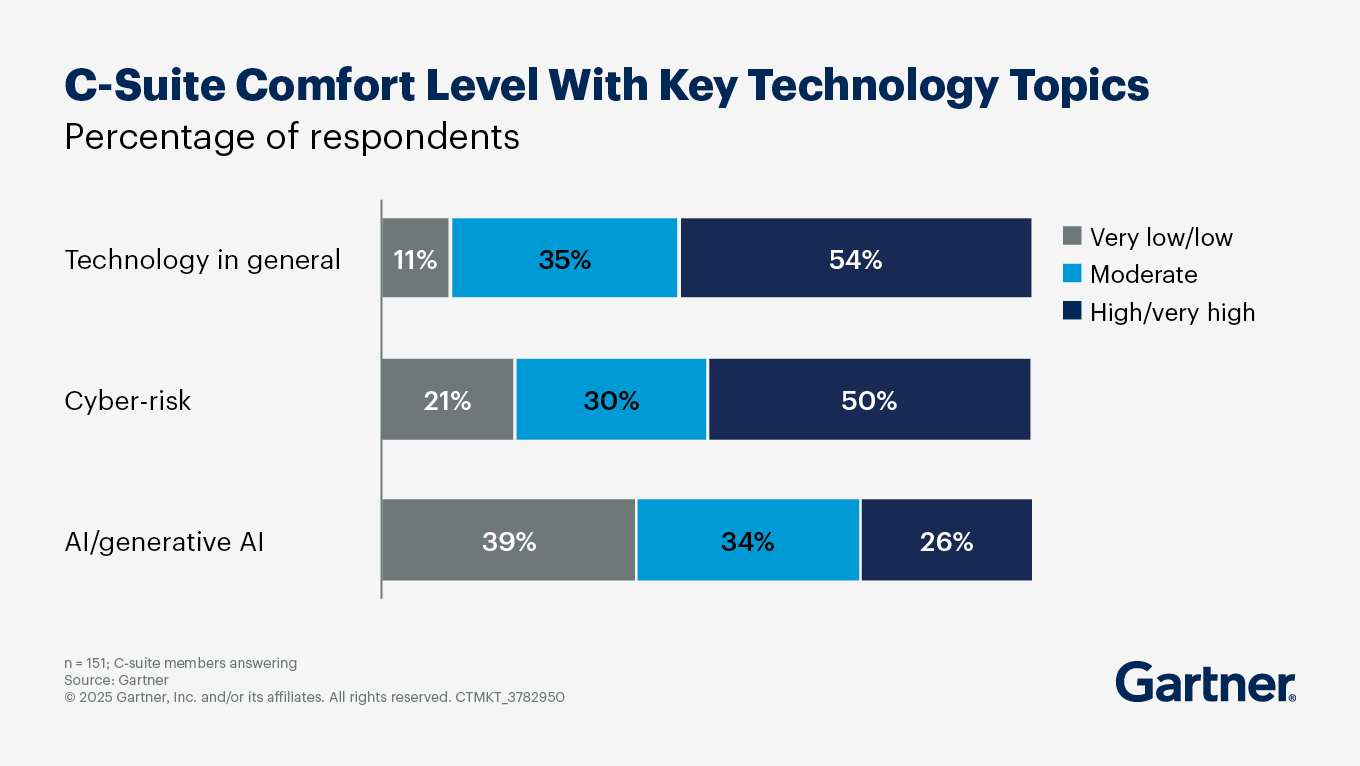C-suite officers lack the AI expertise they need to maximize the benefits of AI, but that’s fixable.
- Gartner client? Log in for personalized search results.
CEOs see AI’s potential, but don’t think their C-suite can maximize it
When Gartner asked CEOs what technology will most significantly impact their industries over the next three years, 83% chose AI. Yet CEOs also think that members of the C-suite lack AI savvy — defined as being proficient in the use of technology and able to create, access, understand and communicate about it.
CEOs aren’t the only ones sensing a skills gap. In a recent Gartner survey of executives, only 26% rated their C-suite peers as confident and proficient in AI, calling out cracks that could create competitive disadvantages.
For stronger, faster AI outcomes, use Gartner’s proprietary AI Use Case Insights tool to explore, evaluate and prioritize over 500 proven AI use cases tailored to your industry.
Why executive AI savvy matters
Organizations stand at the threshold of a new, AI-enabled era of business — one that Gartner calls “autonomous business.” In this era, advanced technology like AI will be a key differentiator, and technologically savvy executives can better position their enterprise to outperform competitors. The faster this learning is acquired, the bigger the potential competitive advantage.
The benefits of fostering an AI-savvy C-suite
When it comes to technology knowledge, you cannot simply leave it to the CIO or other technology-dominant roles, like the chief digital officer or the chief data and analytics officer, to carry the organization.
Technology and AI savviness help everyone:
Make strategic decisions: Executives with a strong grasp of technology and AI can make better-informed, more data-driven decisions that align with the enterprise’s strategic goals.
Pursue competitive advantage: Technologically savvy executives can better position their organization to outperform competitors who may lack that savviness.
Transform the culture: AI-savvy leaders can lead by example to foster an environment that embraces change and experimentation.
Manage risk: Savviness is crucial for identifying and managing the enhanced levels of risk that exist in today’s digital-first environments, as well as addressing ethical considerations.
Engage stakeholders: AI-savvy executives can more effectively communicate the value and impact of technology and AI initiatives to stakeholders.
Overcome fear, uncertainty and doubt: Improving savviness can reduce concerns grounded in a lack of information, while also improving stakeholder engagement and performance.
Evolve AI savviness from basic to expert
Adopt a scale of executive savviness to measure a leader's current level and provide the appropriate development to help them progress.
Basic: Aware of AI concepts, terminologies and applications, and clear about the inputs and outputs of different AI use cases and applications.
Intermediate: Clear about the benefits of AI — and how they are distinct from the benefits of other technologies — from both a business and an ethical standpoint.
Advanced: Can make sound business and ethical judgements about AI. Bridges the gap between recognizing AI’s theoretical benefits and generating tangible value from it.
Expert: Knowledge enough about AI to teach or mentor on AI use and translate AI implementation into shareholder value.
Do not rely on embedded AI features within enterprise platforms to provide the knowledge and skills people need. They are not a substitute for learning and could introduce operational risk for the enterprise.
Take steps now to cultivate AI savvy
Promote continuous education in AI: Offer workshops, seminars, online courses and boot camps focused on AI and emerging technologies. Create space for dedicated learning time each week and consider making certification mandatory.
Create an AI advisory board: Include partners and industry experts to discuss and provide insights on the various aspects of AI implementation in your organization, such as mitigating issues from deepfakes, security and privacy issues, and value capture.
Foster cross-functional partnership: Encourage collaboration and informal meetings between business executives and technology teams to enhance understanding and integration of AI solutions. Establish a C-suite community of practice (CoP) that will pilot using AI to assist with or automate specific tasks — with help from AI experts from the organization.
AI skills gap FAQs
Are C-suite leaders ready for the AI revolution?
More than 80% of all CEOs believe that AI is the technology that will have the most significant impact on their industries over the next three years. Yet they also think their executive team is unprepared to capitalize on this opportunity. Only 44% of CIOs and 46% of CISOs have the AI knowledge and awareness CEOs think will be needed this year and next.
How can organizations narrow the AI skills gaps?
Begin by measuring leaders’ current level of AI skill and knowledge and, based on their starting point (basic, intermediate, advanced), provide the appropriate development to help them progress to the next level. Personalized development programs can help executive leaders build the AI skills they need.
Attend a Conference
Accelerate growth with Gartner conferences
Gain exclusive insights on the latest trends, receive one-on-one guidance from a Gartner expert, network with a community of your peers and leave ready to tackle your mission-critical priorities.

Drive stronger performance on your mission-critical priorities.
